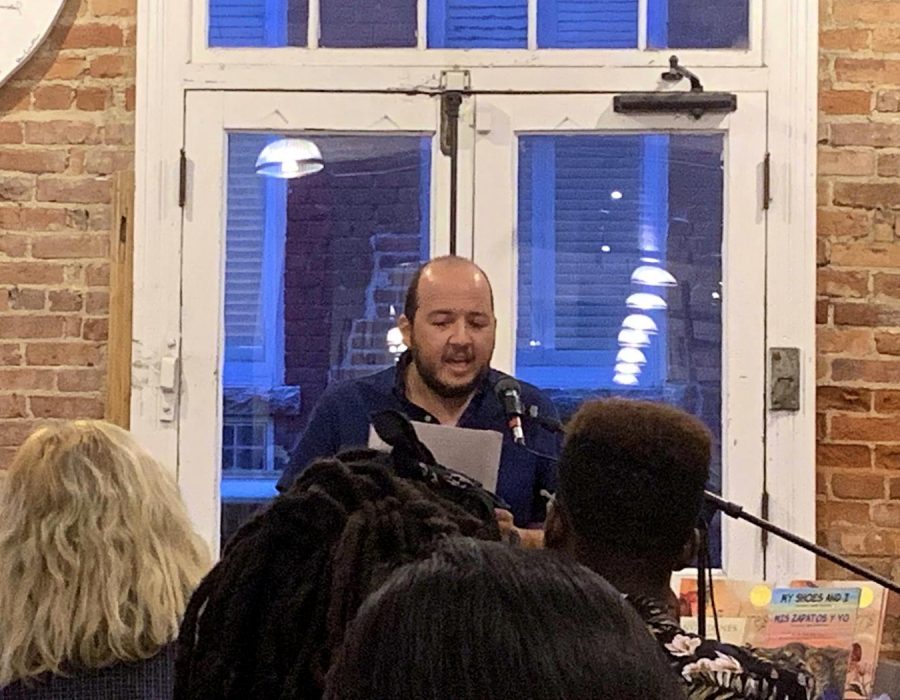Reading brings community together to raise money for families at the border
Writer Oswaldo Estrada, a UNC-Chapel Hill professor of Spanish and Latin American Studies, reads at Scuppernong Books during the Writers for Migrant Justice event on Sept. 4.
As tensions continue to intensify along the U.S.-Mexico border, the tragedies that occur there
often seem to get drowned out by the incessant arguing of politicians. In an effort to support
migrant families and remember the deceased, writers and community members gathered to
perform and listen to music, poetry and writing at Scuppernong Books in downtown Greensboro
on Wednesday, Sept. 4, at the Writers for Migrant Justice benefit.
The reading was a part of a national event in over 40 cities to raise money for Immigrant
Families Together (IFT), an organization that pays bonds for immigrant parents and works to
reunite and support migrant families. More than $500 was raised from Scuppernong Books alone
by the end of the night.
In Greensboro, a small crowd gathered in the back of a cozy bookstore, listening intently as
writers like Diya Abdo, Hayden Carrón, Oswaldo Estrada, Alexis Orgera and Ibrahim Sayed
read book excerpts, short stories and poems about the immigrant experience, several of which
were composed specifically for the event. Community readers, including UNCG faculty and
students from the UNCG Articulate club, also volunteered to read from a collection of books and
poems by immigrant writers.
Each performance touched on unique points, from navigating today’s political landscape as a
minority to personal reflections on growing up as an immigrant in a polarized America.
Emilia Phillips, an assistant professor in the MFA Writing Program at UNCG and the organizer
of the Greensboro reading, read a brief statement prepared by IFT.
“It is very difficult for us to find the names of our deceased community members online,” Phillips
said, “because often the deaths of migrants are treated as a mere statistic and not the passing
of someone’s mother, father, sibling or cousin.”
The speech ended with the names of six migrant children who died in U.S. custody from
Sept. 2018 to May 2019: Darlyn Cristabel Cordova-Valle, Jakelin Caal Maquín, Felipe
Gomez Alonzo, Juan de León Gutiérrez, Wilmer Josué Ramírez Vásquez and Carlos
Hernandez Vásquez.
“It’s really hard when we hear the names of all the deceased in the media and we don’t have a
moment to grieve them, and sometimes it just becomes overwhelming,” said Quilla, a Canadian-
Peruvian musician who performed at the reading. “Through art and music, that’s the way we can
channel it, that’s the way we can grieve and that’s the way we can come together.”
She sang two songs: a cover of “La Llorona” dedicated to those who had passed away at the
border and an original song titled “Animales” about her experiences living in Peru.
All the attendees came from different backgrounds but were united by their belief in the
importance of bringing awareness to the situation at the border. One of the audience members,
Christopher Camacho, whose parents crossed the border in the late ‘90s, expressed his hopes
for progress: “I just hope that somewhere down the line… amnesty comes through, and we’re
able to be accepting of a lot more people.”
“This (the reading) is important because the world needs to know what’s been going on,” said
Charliyah Jefferies, who came out from Shelby, N.C., due to her interest in spoken word poetry.
“People’s voices need to be heard.”
As the event came to a close, organizers thanked attendees for their donations and their time.
At 9 p.m., while people were leaving, several were still energetically discussing the candid
stories they had heard throughout the night, brought together by the reading and their shared
experiences.
Jose Antonio Vargas, a Pulitzer-prize-winning journalist whose stories were featured at the
reading, said: “At the end of the day, stories connect us, not politics. And there’s so many
stories out there waiting to be told. It’s just a matter of who’s out there listening.”







